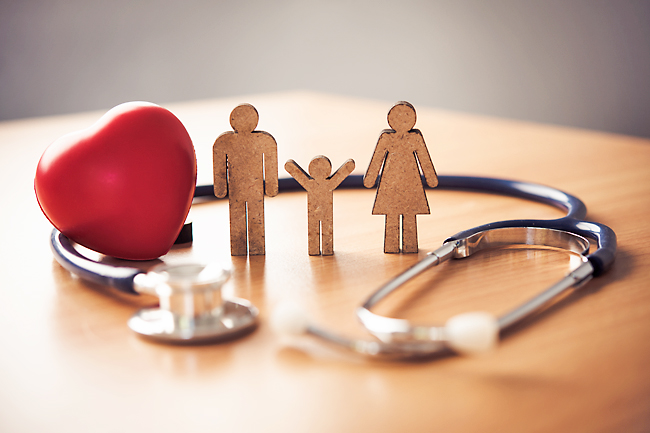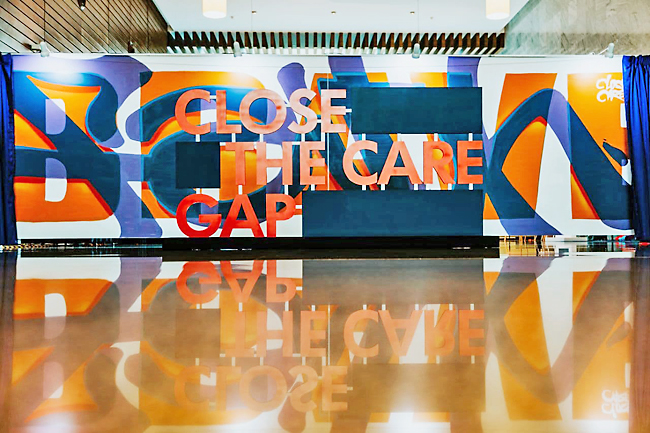Contributed by The Brunei Cancer Centre (TBCC) of Pantai Jerudong Specialist Centre (PJSC), Consultant Radiation Oncologist Dr Vedapriya Ramamurthy, Medical Officer Dr Nur Sabrina Khadijah binti Mohd Sabri & Medical Officer Dr Appalasamy Narasamuloo
World Cancer Day is an annual international event that takes place on February 4.
It serves as a reminder to all of us to recognise cancer as one of our major medical and health issues.
WHY DO WE HAVE WORLDCANCER DAY?
We can create awareness to help people understand cancer, reduce fear, debunk myths and misconceptions, and alter behaviours and attitudes by addressing the fact that cancer affects many more people than HIV, Malaria, and Tuberculosis combined.
This could make it so much easier for patients to report early, which may improve their chances of survival in certain cancers.
World Cancer Day is led by the Union for International Cancer Control (UICC) that unites and supports the cancer community to reduce the global cancer burden, to promote greater equity and ensure cancer control the world over.
As per UICC, one third of cancer cases can be prevented. Another third can be cured if detected early and treated properly.
Brunei Darussalam is one of the proud members of UICC and has been actively engaged in the promotion of World Cancer Day for many years. The theme designated for World Cancer Day for 2022 to 2024 is ‘Close The Care Gap’.



The first year of the ‘Close the Care Gap’ initiative is centred on recognising and analysing cancer care inequalities throughout the world. The care gap results in the differences in cancer outcomes between countries.
The care gap is also present within a country in terms of cancer outcomes in individuals based on income status, level of education, ethnicity, social background, sex, age and address of abode.
There are numerous studies in many countries, rich and poor, which support the differences in cancer patient outcomes and care based on the aforementioned parameters.
In Brunei Darussalam, the care gap can be divided into multiple levels like prevention, screening, diagnosis, treatment, and post treatment care of cancer patients.
In this article, we will touch on cancer prevention, screening and treatment.
Public awareness campaigns to follow a healthy lifestyle and avoidance of tobacco smoking are conducted regularly in Brunei Darussalam.
Despite such intensive programmes by the Ministry of Health (MoH) through the Health Promotion Programme over the years, there remains a significant proportion of Brunei population who are overweight or obese and many still smoking.
A recent study showed that despite banning of tobacco sales since 2005, 36 per cent of adult males in Brunei still smoke with a smaller proportion of women (four per cent) doing the same.
The obesity rate among the public is increasing and is also noted in children over the
last decade.
PREVENTION IS BEST
A healthy lifestyle is key to good health. Regular exercise combined with a diet rich in greens and fruits and low in fats and cholesterol, as well as keeping a healthy weight, has been shown to lower the risk of numerous illnesses, including cardiovascular disease, diabetes, and cancer.
Studies have proven that persons who stopped smoking will reduce their risk of cardiovascular disease and cancer to risk levels of persons who have never smoked after 10 to 15 years.
All individuals in Brunei have a lifetime risk for developing cancers. For men, there is a one in four chance of developing cancer and for women, it is higher at one in three.
An observation in the past 10 years is that the rate of overweight and obesity has increased over the past decade with certain related cancers increasing in tandem.
In Brunei Darussalam, there are initiatives to improve the level of exercise among the public with events like walkathons, running or cycling events or Bandarku Ceria (and in the other major towns and districts), the availability of numerous nature walks, and gymnasiums available to the paying public.
Many people, however, do not devote enough time to regular exercise, claiming a lack of time, being too busy with work or family, or a lack of motivation as reasons.
Lack of time due to work or family obligations, lack of enthusiasm, or lack of facilities are all frequent reasons for not exercising regularly.
Regular workouts can be as little as 30 minutes for five times a week and can be done from the convenience of your own home.
Obesity and overweight are defined as excess body fat to the extent it has negative impact
on health.
Obesity is defined as having a body mass index (BMI) of more than 30kg per square metre and overweight is defined as having a BMI of 25 to 30kg/m2. Both overweight and obesity (especially) are related to numerous cancers including cancers of the uterus (womb), oesophagus (gullet), breast (postmenopausal), bowel, liver, pancreas, and kidneys.
An obese woman with a BMI of 40 or more compared to a woman with normal BMI has an eight fold greater risk of developing uterine cancer!
In Brunei, the rate of obesity is still on the increase in adults and adolescent children over the last 10 years. Sixty-one per cent of Bruneians are overweight or obese! Bruneian children have the second highest obesity rate in ASEAN nations.
This will negatively impact on the cancer burden in the coming decades.
Certain cancers are related to exposure of chemicals or pathogens (infection). In the latter, vaccination programmes can be very effective.
Preventive vaccination schedule is available in Brunei against viruses like Human Papilloma Virus (HPV) and Hepatitis B Virus (HPB).
Cervical cancer and liver cancer can both be reduced with vaccination against these viruses. HPV vaccine is accessible to girls in school aged 11 and above, as well as women who are sexually active.
Since the introduction of HPV vaccine in 2012 and a Pap Smear screening programme in 2009, the incidence of cervical cancer in Brunei has decreased dramatically over the last 10 years.
In recent years, uterine and ovarian cancers have surpassed cervical cancer as the most common gynaecological cancer.
Brunei’s progress in reducing cervical cancer incidences is consistent with cervical cancer trends in developed nations. This was a care gap that was closed.
SCREENING FOR CANCER
Screening is an effective way to combat cancer.
Screening uses a set of measures in a target population to detect the early onset cancer in persons without symptoms for a particular cancer.
Screening is proven to save lives. For Brunei, National Health Screening Programmes (NHSP) under the MoH are available for three types of cancer screening (colorectal, breast and cervical cancer screening).
Colorectal and breast cancer screening have been available since 2019. For more information on the NHSP, visit www.ppkk.gov.bn website available in both English and Malay.
THE CARE GAP IN CANCER SCREENING
The obvious care gap in the past year and a half to two years is the onset of the COVID-19 pandemic which has significantly curtailed screening programmes not only in Brunei but in many other nations worldwide.
It is anticipated that many newly diagnosed cancer patients may present with more advanced disease staging due to a delay in diagnosis.
As with any screening for a disease, pitfalls to the effectiveness for same is the lack of take up of same in the target population.
One major pitfall is negative public perception and the lack of awareness to the medical reasons behind screening. Screening saves lives.
A study in 2019 in Brunei showed that there was a significant increase in the number of new colorectal cancer (CRC) cases from 2010-2017 compared to 2002-2009 with a disproportionate increase in the cases compared to the relative increase in the population of Brunei in the same period.
They found that there was an increase in the proportion of younger CRC patients and a high proportion of CRC diagnosed at advanced stages.
The authors concluded the importance of public health policies and programmes to enhance cancer prevention strategies and improve awareness on CRC including screening, symptom recognition among the younger population, healthy lifestyle practices, and the significance of early diagnosis and early intervention, to reduce CRC-associated mortality.
Screening often results in early undetected cancers that are more amenable to curative treatment and lead to long term survivors.
THE CARE GAP IN CANCER TREATMENT
For the diagnosis of cancer, Brunei has all the facilities like radiology, a pathology including state of the art PET scanning.
Treatment modalities like chemotherapy, radiotherapy and surgery are available in the country and are on par with services in other countries with an equivalent high human development index. And all the modalities (specialities) work as a team to give the best possible outcome to any individual with case discussion and multidisciplinary deliberations.
Highly sophisticated state of the art radiation machines are available for people who were previously required to travel abroad for same.
Recently, an additional feather to the cap was the brachytherapy facility, which can deliver high dose to the tumour, like cervical cancer. These were care gaps that have been bridged over the past decade.
Though patients can avail of such medical facilities in the various centres mentioned above, there is still a lack of take up of often lifesaving and potential curative therapy.
A noticeable care gap in cancer treatment in Brunei is the lack of cancer treatment awareness in patients with cancer and their carers. Another care gap is that there is a lack of awareness of the patients’ needs.
These care gaps can lead to poor attendance or take up of life saving cancer treatments by patients and diminished support from the patient carers and caregivers.
In 2017, Universiti Brunei Darussalam (UBD) research found that cancer care (delivery) can be improved with an increased awareness and understanding of the disease including addressing the needs of the carer.
The authors cited that further research is needed locally to identify the knowledge gaps in patients and their carers and identifying the needs of the population of patients and carers.
This may ultimately lead to improvement in patients in Brunei presenting with more curable disease and less advanced disease and improved adherence to therapy offered (from better attendance) and ultimately better outcome in many patients.
In short, potentially more patients may be saved over time rather than succumb to their cancers if this care gap can be closed. Over time the addition of specialist dietitians, physiotherapists, occupational therapists, psychologists and social welfare support teams just to name a few have been added to bridge such gaps. The aim is to provide a holistic approach to cancer care.
One area of patient care of equally great importance is the need to relieve cancer symptoms and distress for patients and their carers. Palliative Care Medicine addresses same and work concurrently with cancer treatment or on its own to improve the quality of life of patients with cancer. Palliative care provides significant support on top of conventional cancer treatment. This was a significant care gap that was lacking in the past.
ROLE OF PALLIATIVE CARE MEDICINE
Palliative care service in Brunei is relatively new with only two hospitals providing the service which includes The Brunei Cancer Centre (TBCC) of Pantai Jerudong Specialist Centre (PJSC).
The first Palliative Care Department in Brunei was established at Raja Isteri Pengiran Anak Saleha (RIPAS) Hospital in 2009.
TBCC was built later to provide comprehensive management for cancer patients and palliative care service was included as well.
Early referral to Palliative Care service is essential to reduce the care gap among the physician and the patients.
According to Temel et al, “among patients with metastatic non–small-cell lung cancer, early palliative care led to significant improvements in both quality of life and mood. As compared with patients receiving standard care, patients receiving early palliative care had less aggressive care at the end of life but longer survival”.
Oncologists and other treating physicians must be aware of the role of Palliative Care services and incorporate them as a team to provide comprehensive and holistic care to the patients to help them during their treatment and support them till the end of it.
Proper explanation about Palliative Care service is needed for the patients to understand that referral to Palliative Care doesn’t mean the treating physician ‘giving up’ on them.
This will not only improve the quality of life of the patient but will also close the care gap.







